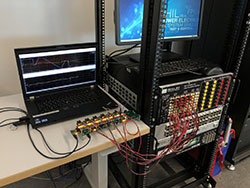
![]()
Xiera Technologies Inc. has developed an intelligent FLC with auto-tuning machine learning capabilities, allowing the controller to be tuned in a time efficient manner. Xiera asked Mohawk College's Energy and Power Innovation Centre (EPIC) to perform the necessary testing and validation of the FLC platform.

Research Area: Energy and Power Innovation Centre, IDEAWORKS
Funder: Ontario Centre of Innovation
Research Team: Laith Al-Musawi, Rutul Bhavsar, Patrick McInnis, Mariano Arriaga
Future Ready Challenge
As industry adopts more machine learning and Artificial Intelligence (AI) solutions in their operations, the value of fuzzy logic is clear: the logic allows problems to be framed in ways similar to how human operators understand them, capturing the complexity of decision making that occurs in process control applications. However, industry adoption of Fuzzy Logic Controllers (FLC) has been slow; the time consuming and complex parameter tuning process required for fuzzy logic systems has been a barrier for industry adoption.
R & D Collaboration
Xiera Technologies Inc. has developed an intelligent FLC with auto-tuning machine learning capabilities, allowing the controller to be tuned in a time-efficient manner. Before commercializing their product, Xiera required third-party testing and validation. Xiera asked Mohawk College's Energy and Power Innovation Centre (EPIC) to perform the necessary testing and validation of the FLC platform, with a focus on how the device can integrate with hardware and industrial processes, and on comparing its performance to traditional Proportional–Integral–Derivative (PID) controllers.

(Left) The multi-variable control setup using the Xiera controller and the OPAL-RT system.
Innovative Results
Over a six-month period, the Mohawk research team focused on identifying and replicating practical applications of industrial operations for the FLC technology in a lab environment. The first case focused on a Single Input Single Output (SISO) lab setup used for speed control of a small DC motor. This case study helped the Mohawk College team to get familiar with the technology, as well as compare the actual performance of FLC vs. a PID controller. The second case raised the bar by emulating a more complex Multi-variable Control System (MCS) to replicate an industrial distillation tower process. This implementation was possible via a Hardware-In-the-Loop (HIL) setup using a real-time simulator (OPAL-RT) to replicate the distillation column process and send input/output signals to the physical FLC controller.
The system was successfully tested and compared for a 2x2 and 3x3 input/output MCS configuration, which is not an insignificant control process that FLC was able to control.
The research team validated the performance of the intelligent FLC, showing that it can achieve smoother control and faster steady state response when comparing it to a traditional PID controller.
"We are proud that Mohawk supported us by validating our technology and supported the shift to a new control methodology in industry," says Talib Janabi, Founder of Xiera Technologies Inc.

